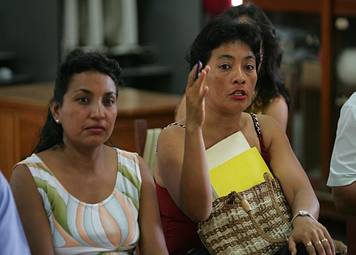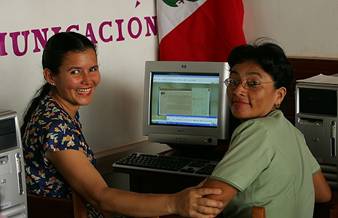Marching for Gender Equity in Peru
April 2005

© Photos by Karl Grobl, 2004
A Movement Underway
High in the Peruvian Andes a grassroots movement supporting gender equity has taken hold. Led by a group of primary school students and their teachers, the community of Cerro de Pasco is taking a closer look at the implications of equal treatment and rights for men and women in the public and private spheres. While small in stature, this group of eight to ten year olds is robust in number and undoubtedly convincing in their clear message championing women's rights. "Equal rights for women" the uniformed group chants in unison to the Peruvian drums. "Stop machismo! Respect women's rights!" they rally, holding signs they've made that reflect this message. The march is one outcome of a gender equity workshop for teachers conducted as part of the USAID-funded dot-EDU CAPTIC project in Peru. "Gender equity is of critical importance in a country where girls typically find themselves sidelined inside and outside the classroom by societal norms," explained Education Development Center, Inc. (EDC) Project Director, Sonia Arias.
Setting the Stage
EDC designed CAPTIC as a way to test the efficacy of a hybrid model of on and off-line professional development to improve teaching and learning in distant and remote areas. According to EDC Instructional Designer, Daniel Light, "The project, Strengthening Teaching Practices through Information and Communication Technologies (CAPTIC), provided a unique opportunity to strengthen pedagogy by encouraging teachers to diversify their instructional strategies away from rote memorization and experiment with project-based learning."
In collaboration with Boston-based Concord Consortium and the Peruvian Ministry of Education's Huascarán Project, EDC conducted five core on-line and face-to-face trainings to support teachers in developing essential skills and a critical understanding about the use of Information and Communication Technologies (ICT) in fostering student-centered, project-based teaching and learning, with a focus on gender equity.
Initiating the Dialogue

Workshop participants in Pucallpa City, Peru
The project first addressed the challenge of gender discrimination in the classroom through a series of four two-day workshops aimed at promoting equity and excellence in classrooms and online environments. Many participants traveled for over a day and a half to join their colleagues in the workshop, which introduced them to the latest research-based practice on equitable classroom strategies and techniques, and how to create and maintain gender-healthy online communities. Led by EDC?s Gender, Diversities & Technology Institute (GDTI), these interactive workshops provided an ideal venue for teachers to reflect on, discuss and begin to tackle gender biases. "Very interesting, innovative, and reflective," commented a teacher in Chupaca, a workshop site 4,100 meters above sea level in the Peruvian Andes. "The workshop was very necessary," concluded another participant,"I hope that one will also be developed for the teacher education program and for the parents."
Facilitator Sundra Flansburg designed the workshop as a way to help participants reflect on the ways that gender discrimination is evidenced in classroom interactions, curricula and physical environments as well as in online communities. Some of the issues found in single sex schools were also discussed, as some participants teach in all-girl schools. Teachers discussed gender issues inside the classroom and worked in small groups to strategize and develop responses to a variety of real-world experiences they encountered. Though the workshop focused primarily on promoting gender equity in formal educational environments, participants also found it relevant to their interactions outside of the classroom.
Acknowledging Gender Issues Beyond the Classroom
Flansburg encouraged participants to reflect on and raise questions about how gender discrimination occurs. "We must acknowledge that indigenous people still face more discrimination and more poverty," voiced a teacher from Oxapampa, an area serving mainly indigenous populations. Participants recognized the challenge of promoting equal rights in the different cultural context of Quechua and Aymara communities. Flansburg explained that teachers want to help balance gender inequities but also support the strengths of indigenous cultures.
Peru's multilingual heritage is part of this indigenous culture. Workshop participants explained that while most of the indigenous students speak Quechua or another language in their homes, schools are primarily Spanish speaking. "We are making a concerted effort to respond to the demand for supporting and protecting indigenous languages by developing and pilot testing a bilingual curriculum within Asháninka and Yanesha communities in Oxapampa," stated a director from one of the four teacher training institutes active in CAPTIC. "Our goal is to have the final curriculum accepted and approved as an alternative curriculum by the Ministry of Education."
New Technologies and Equity

Teachers work together in the computer lab.
The workshop also provided a setting in which participants could share and discuss their individual experiences as new technology users. As part of the CAPTIC program, teachers participated in a six-week online course that included lessons in how to use computer software such as Word and Power point, the internet and participate in a online discussion forum with colleagues. Female participants reflected on their experiences within the larger project and noted that while they were eager to participate, they felt somewhat frightened and uncomfortable knowing that it relied heavily on computer skills.
Male participants on the other hand, expressed little apprehension about interacting with the technology, and generally noted that they felt confident in their ability to successfully learn the skills needed to complete the trainings. Light explained, "This discrepancy is not surprising, and is indicative of the gender disparity associated with technology use. One of the focuses of the online workshops was to help teachers feel comfortable with the computers and also feel at ease communicating in an online environment, where there is no face-to-face contact."
Evidence of Change
The "gender equity march" is just one outcome of this workshop; participants initiated other gender-focused project activities in their own communities as well. Several teachers adapted Flansburg's workshop, and delivered context specific versions to their students, communities and colleagues. In Cerro de Pasco, teachers collaborated to develop a multi-faceted action plan, which included organizing focus groups to identify strategies for tackling the diverse forms of sexism found in their institution, and sponsoring student-led discussions and demonstrations. Other participants integrated equity concerns into their teacher education curricula or into the Ministry's plans for teacher professional development. "The ultimate success of this workshop is evidenced in the degree to which teachers recognized the importance of community and parental involvement," said EDC Project Director Sonia Arias.
However, as teachers attempted to translate workshop activities into their classroom practices, many noted an initial resistance from parents. According to participants, attempts to physically restructure the classroom to correct gender divisions and involve boys in classroom clean-up, for example, were met with resistance from girls and boys and prompted calls and visits from parents. Teachers helped to address parental concerns by initiating meaningful dialogue with them about the dangers of gender inequity and why achieving a gender balance is critical to overall student success. "In addressing parental concerns, the teachers stressed that they were not trying to make their sons weak, but rather to give each student the opportunity to try new things and develop their potential," reported one participant. It is clear from this experience that real understanding and dialogue about gender equity in education must happen not only inside the classroom, but out in the community as well--and the communities, teachers and students involved in CAPTIC have made such dialogue possible.
For more information, please contact:
- EDC Project Director (IES), Sonia Arias, sarias@edc.org
- EDC Instructional Designer (CCT), Daniel Light, dlight@edc.org
